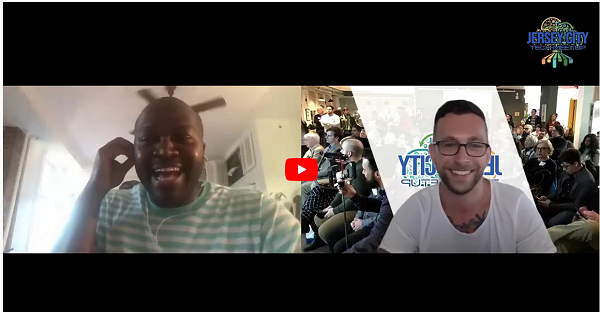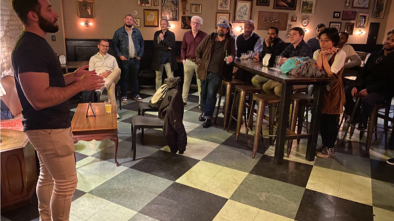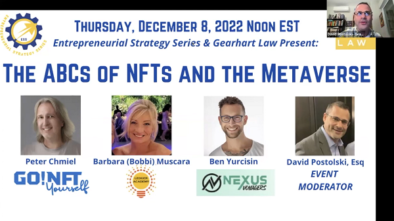The Jersey City Tech Meetup Holds a Discussion about Race
[From the June 24 Jersey City Tech Meetup (JCTM) Event Description: “2020 has opened our eyes to many racial injustices that have been occurring for centuries. Though these issues aren’t new by any means, it is more important now than ever to educate ourselves and gain a new perspective on issues of racism and how to implement values of acceptance and diversity in both our every-day lives and businesses.” ]
⠀⠀⠀⠀⠀⠀⠀⠀⠀
As a preamble to the virtual JCTM Zoom Meetup on June 24, organizer Ben Yurcisin described seeing a Facebook post from his friend Corey Cambridge indicating that he (Corey) was both open to and proactively welcoming discussions with others about the topic of “Race in America.”
Yurcisin happily took him up on that invitation, and the event turned out to be a very enlightening conversation around issues of racism and diversity in America. For the benefit of readers of this article and to provide additional context, Mr. Yurcisin is white and Mr. Cambridge is black.
JCTM fans and frequent attendees may recall that Cambridge had previously appeared as a panelist at the May 2019 Pod-preneurs meeting — which covered topics, tips and tricks related to the podcasting industry. For additional info on Cambridge’s two podcasts, including recommendations of fellow podcasters and recent guests, please see the end of this article.
A New York resident for the past 10 years, Cambridge will soon be relocating to LA. His earlier ambition was to become a rapper, but he has instead pursued the field of podcasting.
According to Yurcisin, “It [his recent conversation with Cambridge] was so eye-opening for me that I felt it needed to be taken to a public platform [JCTM] so others could benefit from his perspective, just as I have. Being the awesome collaborator that he is, Corey was enthusiastic about the opportunity to share his insights with the greater community, and we couldn’t be more grateful for that.”
⠀⠀⠀⠀⠀⠀⠀⠀⠀
“Race exists. Like air — it’s all around us,” said Cambridge. “It is a factor and plays a role in everything, especially for people of color. This fact is not going to go away.”
There are regional differences in racism in Cambridge’s view. In New York, racism is related to money. “New York City thinks of itself as a liberal town. If you move out of a specific neighborhood it’s more likely that you were priced out — demand for that neighborhood grew and you can’t afford to live there anymore,” he said. In the Southern U.S., on the other hand, race is cultural, like in the Civil War.
“For White America to heal, people must acknowledge that they are racists. I’m not meaning to demonize anyone, but centuries of trauma impact Black Americans. Culturally, black people did not come here of their own volition centuries ago.”
To push the healing process forward, he has a practical suggestion: “White People should seek out people of color in economic situations whenever possible. Think about changing your value system: What are the demographics of certain companies and institutions?”
If you’re going to purchase an automobile, seek out a Black car salesperson at the dealership. Patronizing businesses that are run by people of color is good for America, opined Cambridge. When hiring, find a qualified candidate of color for the position to add further balance to the team.
To help effect change, tell your employers that you value diversity and inclusion. Use your privilege and power to help others, and make it a point to hire more people of color. Also, use shame. It works.
“Value shift needs to take place — no matter what legislation gets passed. Mentality must change, and legislation doesn’t necessarily help. We need to put value in anti-racism. People should strive to maintain a balance in their lives — deal with wide varieties of demographics. How can we be blatantly anti-racist? This is important for the future of the country and its citizens.”
It starts at the family level. Parents should strive to instill diversity values in their children — encouraging them to have a wide variety of friends in their lives — including friends of different colors/ethnicities, gay/straight orientations, etc.
What does he want kids to know about the perspective of a black person? The world isn’t fair. Treat people of color with more care in society. Respect everyone, but treat the marginalized people in America with even more care.
There is a distinction between Black and African-American in Cambridge’s eyes. Black means that you are a descendant of slaves. “Barack Obama was the first African-American president because his father was from Africa,” Cambridge stated. “Obama’s father was able to come to America with pride from his native country. People of color that were born here have somewhat different experiences in America.”
Similarly, a Black person from the Caribbean likely has a completely different perspective from that of someone born in the U.S.
Yurcisin asked Cambridge for his thoughts on President Trump. His reply: “Don’t hate him because he came from money, but don’t respect that he is wasting his privilege. What you do when you get in [office] is the key.”
Additional Cambridge soundbites on race in America:
- Donating to causes of color is just the tip of the iceberg in helping to fix problems of the past.
- Listening is important — hearing the struggles of others — truly listening. Understand before you seek to take action.
- Similar to the way people reacted to the #MeToo movement, we need to go out of our way to listen to the struggles of others.
- A disproportionate number of people in prison are people of color.
- There is a lot of frustration amongst black people because they are living on top of each other in tight quarters in many cities.
- Police are here to protect and serve, but flexing power is not the objective or the point.
- Calling the police over minor issues with black people can potentially put them in danger or their lives at risk. George Floyd ultimately died over a counterfeit $20 bill.
- The healthcare system dysfunction with COVID-19 is further highlighting issues of racism, as more people of color have died as a percentage of overall victims.
- Treat people [of color] as if they were your husband, wife or another member of your immediate family. We need to acknowledge that many systems in life are truly broken — politics, healthcare, etc.
- Understand that because you are white you just live in another world. You’re not a bad person — you were just born that way and you have no control of your color.
- America owes a debt of gratitude to Black and Native Americans who helped build the country. Pay that debt back and give your business to people of color.
- Don’t be sad about differences in race. Enjoy having the diversity around you!
Cambridge is currently the host of two podcasts. OPP, which stands for “Other People’s Podcast,” is a curated discovery platform where listeners tune in to learn about a wide array of new and “dope” podcasts, handpicked and recommended by Cambridge.
The most recent trio of hosts highlighted on the OPP site included: Tim Harford (host of “Cautionary Tales”), Caroline Moss (host of “Gee Thanks, Just Bought It”), and Shaun Lynda (cohost of “Two Black Guys with Good Credit”).
Cambridge’s other podcast is called Silent Giants, which is described as a celebration of the geniuses behind pop culture. The most recent guests were: M. Tony Peralta, legendary New York fashion artist and designer; Rob Ackroyd, musical director and lead guitarist of Florence + the Machine; and R. Scott Bromley, architect/interior designer of the famed Studio 54 club.




